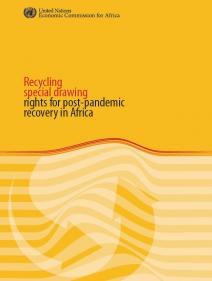The coronavirus disease (COVID-19) pandemic is expected to have a long-lasting impact on the developing world. At the onset of the global health crisis, it quickly became clear that, without adequate support for vulnerable economies, the shock of the pandemic would further widen the development gap between advanced and developing countries. In Africa, the socioeconomic consequences of COVID-19, including negative impacts on the health sector, disruptions in supply and demand and the ensuing job losses, have dampened the effects of the previous two decades of growth and progress on poverty reduction. The pandemic has also exacerbated the continent’s liquidity problems and other finance issues. In the present paper, the merits and feasibility of alternative mechanisms for recycling SDRs from developed economies to low and middle-income countries in Africa are discussed, as is the significance of such resources in the context of the continent navigating COVID-19 and other external shocks, including climate change and the conflict between the Russian Federation and Ukraine. In section 2 of the paper, background on the recent general allocation of SDRs and the advantages of that instrument compared with other financing sources is provided, and SDR utilization across countries and the implications of the current allocation for highly indebted economies are discussed. In section 3, an overview of proposed SDR recycling mechanisms and their feasibility in African countries is provided, while section 4 concludes with a number of policy implications and recommendations.
Share this:
Release Date:
7 July, 2023
© United Nations Economic Commission for Africa

